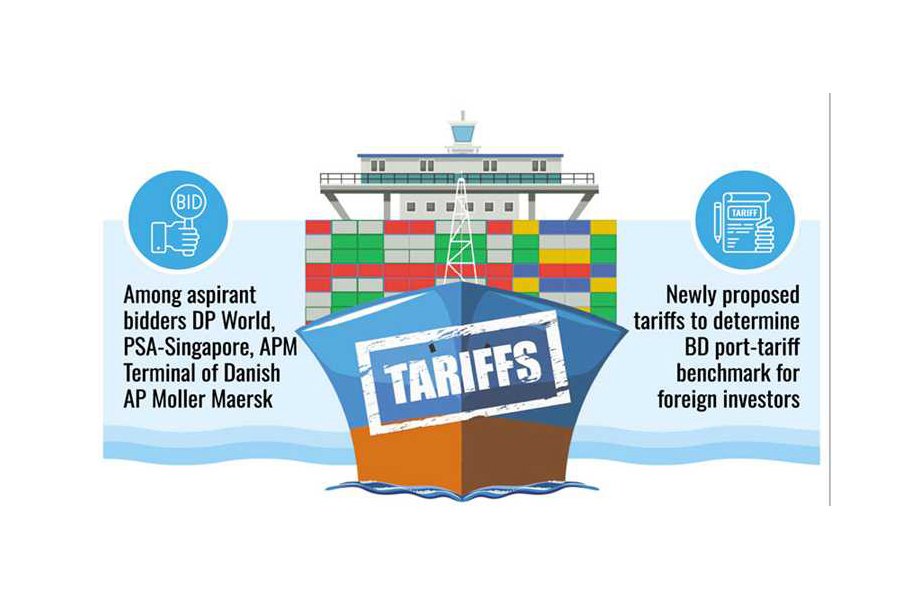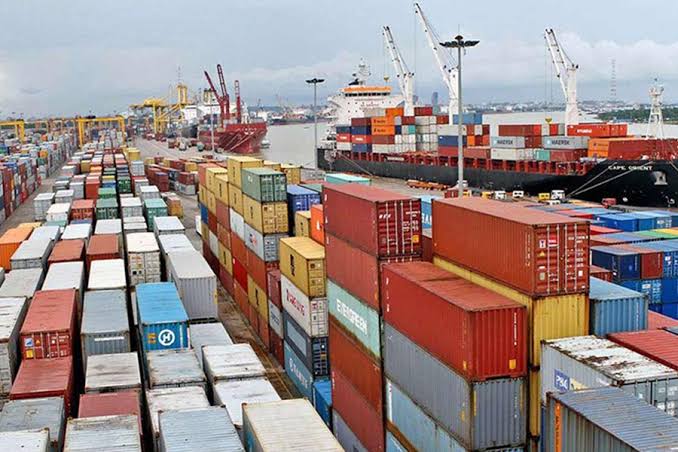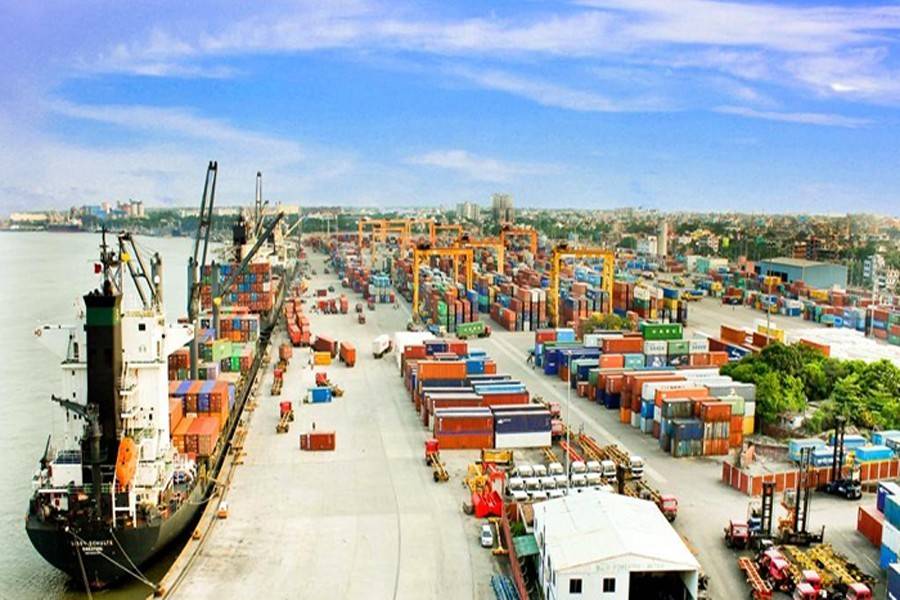Saif
Senior Member
- Joined
- Jan 24, 2024
- Messages
- 15,397
- Reaction score
- 7,874
- Nation

- Residence

- Axis Group


Deals with foreign firms likely by Oct to operate Ctg port facilities
Foreign direct investment is set to flow in Chittagong-seaport facilities as the interim government intends to break long-lasting FDI droughts before national elections to make its finish memorable. By October, the appointment of internationally reputed port contractors is expected to be finalised
Deals with foreign firms likely by Oct to operate Ctg port facilities
Govt facilitators also cite other port ventures, altogether to make Bangladesh an entrepot
Doulot Akter Mala
Published :
Jul 27, 2025 23:58
Updated :
Jul 27, 2025 23:58

Foreign direct investment is set to flow in Chittagong-seaport facilities as the interim government intends to break long-lasting FDI droughts before national elections to make its finish memorable.
By October, the appointment of internationally reputed port contractors is expected to be finalised through "transparent deals", Shipping Adviser Brigadier-General (rtd) M Sakhawat Hussain told The Financial Express, as dedicated government facilitators kept clearing the messy decks to push through the foreign-investment bids.
A recent report of the United Nations Conference on Trade and Development (UNCTAD) shows an irreversible decline in Bangladesh's FDI inflow continuing for the fourth consecutive year in 2024.
The net flow of foreign direct investment (FDI) into Bangladesh declined by 13.20 per cent to $1.27 billion in 2024 from $1.47 billion in 2023, said The World Investment Report 2025.
The most lucrative investment sector in the country, as of now, is deemed Chittagong seaport areas along the Bay of Bengal that came under global spotlight in recent months, with big-name firms trying to put respective stakes on the business prospects in sight.
To pull much-sought-after foreign investment in the country's prime-port ventures, in the first take, negotiations with the aspiring investors are going full steam ahead. Among the bidders in the beeline are DP World of the UEA, PSA-Singapore and APM Terminal, a subsidiary of Danish AP Moller Maersk.
A synergy of effort from the Ministry of Shipping, Chittagong Port Authority (CPA), Bangladesh Investment Development Authority (BIDA) and Chief Adviser's Office is "progressing fast", officials said.
"Chittagong seaport has all the potential to transform into a regional maritime hub in next three years if efficiency, vibrancy in port operations is ensured," says one of the official engrossed in doing the spadework.
Attuned to the preparation, in the meantime, the port's tariff-hike proposal is in the final stages to implement that would determine Bangladesh's port -tariff benchmark to the foreign investors for the defined port services.
The CPA secretary, Omar Faruk, says the tariff proposal that received clearance from the Ministry of Finance would come through a gazette notification after law-ministry vetting.
The date of effect to the port tariffs would be mentioned in the Gazette, he adds.
"The foreign investors won't be able to set any monopolistic port tariff on the services defined by CPA, as currently Red Sea Gateway in Patenga Container Terminal (PCT) following," he told the FE writer.
Investors may set their own tariffs for additional services where their investment in equipment, logistics matter, he added.
"… the agreements would be transparent without 'hide n seek' on what the government awarding the contract and on what conditions," said the Shipping Adviser of the post-uprising government.
"So far, the shipping ministry is on a right track in port-sector decision-making…growth in container handling by dry dock in NCT is the best example," he added.
The CPA awarded Navy-led Dry Dock the piloting job to operate the New-mooring Container Terminal for six months, starting July 6, 2025, after Saif Powertec's contract expired and the government didn't allow extension.
Initially, there was doubt over slipping the container-handling ratio in the transition period after a long 15-year period operated by one company, but it proved wrong, he said.
Average container handling by the navy-run dry dock increased 7.0 per cent per day.
"We expect to sign deal on Bay Terminal by October next," he said.
On the tariff-hike move, the Shipping Adviser said the port tariffs for the CPA would be set in line with international standards.
As for foreign investors, they would set their own tariffs on the basis of their investment, operational cost and the time period to get profits out of their investment under build-own-transfer (BOT) method.
On Laldia, the adviser said APM Terminal is keen to invest here and sought some additional land but, as there is an air funnel, the process in under review.
Ashik Chowdhury, BIDA Executive Chairman, says all new terminals would need at least until 2028 to come into full operation.
"We have to depend fully on Chattogram port by that time. So, there is no alternative but to improve port efficiency within this period, reducing turnaround, clearance, customs processes."
The new chief promoter of investment notes any foreign investor first makes queries on port efficiency before making any investment in any sector.
"Our preferences would be the port operators having proven track record on port efficiency, be it local or international," he adds.
Responding to a query as to whether next political government will scrap such contract signed by the interim government, Mr Chowdhury said it is unlikely as those international deals have several legal aspects and it is not possible practically.
"There are several geopolitical and diplomatic angles of such agreements. "
There will be sustainable framework on those agreements so that it cannot be deviated, he says about the guardrails.
On LCT, shipping ministry, BIDA, CPA , CA, and IFC (the transaction adviser) are holding meeting every two weeks to proceed on to sign concession agreement by October so the investor can start construction by January of next year,
"It will take two-three years to complete the LCT construction, but we want to complete the documentary part in interim government's regime," he adds.
The FDI would then start to flow in from early next year, and by next two years, there might be $ 600 to $ 800 million worth of FDI in this LCT investment, he expects.
For the Bay Terminal, the Ministry of Shipping has appointed new Project Director. The Shipping Adviser and the internal affairs special envoy to the Chief Adviser, Lutfey Siddiqi, visited PSA-Singapore that is willing to invest in the terminal.
For Laldia port terminal, the transaction adviser of the International Finance Corporation (IFC) has submitted its report to the CPA.
The New-mooring Container Terminal, now under operation by the navy, may also get well-reputed investors, with DP World on top priority, for port operation.
On July 21, key CPA officials-including the chairman and the member (engineering)-attended a meeting at the Shipping Ministry to review the draft of the Transaction Advisory Services Agreement (TASA) supported by the Asian Development Bank (ADB).
The agreement is intended to facilitate the appointment of a transaction adviser for the construction of the Bay Terminal.
Though private sector rings alarm on port-tariff hike this time when Trump's jacked-up tariff is a major concern, the CPA may not have any other option but to raise the tariff rates that remained unchanged since 1886.
With such port tariffs, officials think, no foreign investors would find investment in Bangladesh viable.
To improve customs efficiency, the NBR chairman along with his senior members have started physical inspection of major ports, including Chittagong, Mongla, Benapole, Pangoan.
According to CPA data, the Bay Terminal will enhance the port's annual handling capacity to 5.0 million twenty-foot-equivalent units (TEUS). The CPA secretary mentions that the Matarbari terminal is also progressing fast and may start operation by next year.
"We have already signed civil construction contract with a Japanese company for Matarbari port terminal. It would enhance Chittagong port efficiency."
Govt facilitators also cite other port ventures, altogether to make Bangladesh an entrepot
Doulot Akter Mala
Published :
Jul 27, 2025 23:58
Updated :
Jul 27, 2025 23:58
Foreign direct investment is set to flow in Chittagong-seaport facilities as the interim government intends to break long-lasting FDI droughts before national elections to make its finish memorable.
By October, the appointment of internationally reputed port contractors is expected to be finalised through "transparent deals", Shipping Adviser Brigadier-General (rtd) M Sakhawat Hussain told The Financial Express, as dedicated government facilitators kept clearing the messy decks to push through the foreign-investment bids.
A recent report of the United Nations Conference on Trade and Development (UNCTAD) shows an irreversible decline in Bangladesh's FDI inflow continuing for the fourth consecutive year in 2024.
The net flow of foreign direct investment (FDI) into Bangladesh declined by 13.20 per cent to $1.27 billion in 2024 from $1.47 billion in 2023, said The World Investment Report 2025.
The most lucrative investment sector in the country, as of now, is deemed Chittagong seaport areas along the Bay of Bengal that came under global spotlight in recent months, with big-name firms trying to put respective stakes on the business prospects in sight.
To pull much-sought-after foreign investment in the country's prime-port ventures, in the first take, negotiations with the aspiring investors are going full steam ahead. Among the bidders in the beeline are DP World of the UEA, PSA-Singapore and APM Terminal, a subsidiary of Danish AP Moller Maersk.
A synergy of effort from the Ministry of Shipping, Chittagong Port Authority (CPA), Bangladesh Investment Development Authority (BIDA) and Chief Adviser's Office is "progressing fast", officials said.
"Chittagong seaport has all the potential to transform into a regional maritime hub in next three years if efficiency, vibrancy in port operations is ensured," says one of the official engrossed in doing the spadework.
Attuned to the preparation, in the meantime, the port's tariff-hike proposal is in the final stages to implement that would determine Bangladesh's port -tariff benchmark to the foreign investors for the defined port services.
The CPA secretary, Omar Faruk, says the tariff proposal that received clearance from the Ministry of Finance would come through a gazette notification after law-ministry vetting.
The date of effect to the port tariffs would be mentioned in the Gazette, he adds.
"The foreign investors won't be able to set any monopolistic port tariff on the services defined by CPA, as currently Red Sea Gateway in Patenga Container Terminal (PCT) following," he told the FE writer.
Investors may set their own tariffs for additional services where their investment in equipment, logistics matter, he added.
"… the agreements would be transparent without 'hide n seek' on what the government awarding the contract and on what conditions," said the Shipping Adviser of the post-uprising government.
"So far, the shipping ministry is on a right track in port-sector decision-making…growth in container handling by dry dock in NCT is the best example," he added.
The CPA awarded Navy-led Dry Dock the piloting job to operate the New-mooring Container Terminal for six months, starting July 6, 2025, after Saif Powertec's contract expired and the government didn't allow extension.
Initially, there was doubt over slipping the container-handling ratio in the transition period after a long 15-year period operated by one company, but it proved wrong, he said.
Average container handling by the navy-run dry dock increased 7.0 per cent per day.
"We expect to sign deal on Bay Terminal by October next," he said.
On the tariff-hike move, the Shipping Adviser said the port tariffs for the CPA would be set in line with international standards.
As for foreign investors, they would set their own tariffs on the basis of their investment, operational cost and the time period to get profits out of their investment under build-own-transfer (BOT) method.
On Laldia, the adviser said APM Terminal is keen to invest here and sought some additional land but, as there is an air funnel, the process in under review.
Ashik Chowdhury, BIDA Executive Chairman, says all new terminals would need at least until 2028 to come into full operation.
"We have to depend fully on Chattogram port by that time. So, there is no alternative but to improve port efficiency within this period, reducing turnaround, clearance, customs processes."
The new chief promoter of investment notes any foreign investor first makes queries on port efficiency before making any investment in any sector.
"Our preferences would be the port operators having proven track record on port efficiency, be it local or international," he adds.
Responding to a query as to whether next political government will scrap such contract signed by the interim government, Mr Chowdhury said it is unlikely as those international deals have several legal aspects and it is not possible practically.
"There are several geopolitical and diplomatic angles of such agreements. "
There will be sustainable framework on those agreements so that it cannot be deviated, he says about the guardrails.
On LCT, shipping ministry, BIDA, CPA , CA, and IFC (the transaction adviser) are holding meeting every two weeks to proceed on to sign concession agreement by October so the investor can start construction by January of next year,
"It will take two-three years to complete the LCT construction, but we want to complete the documentary part in interim government's regime," he adds.
The FDI would then start to flow in from early next year, and by next two years, there might be $ 600 to $ 800 million worth of FDI in this LCT investment, he expects.
For the Bay Terminal, the Ministry of Shipping has appointed new Project Director. The Shipping Adviser and the internal affairs special envoy to the Chief Adviser, Lutfey Siddiqi, visited PSA-Singapore that is willing to invest in the terminal.
For Laldia port terminal, the transaction adviser of the International Finance Corporation (IFC) has submitted its report to the CPA.
The New-mooring Container Terminal, now under operation by the navy, may also get well-reputed investors, with DP World on top priority, for port operation.
On July 21, key CPA officials-including the chairman and the member (engineering)-attended a meeting at the Shipping Ministry to review the draft of the Transaction Advisory Services Agreement (TASA) supported by the Asian Development Bank (ADB).
The agreement is intended to facilitate the appointment of a transaction adviser for the construction of the Bay Terminal.
Though private sector rings alarm on port-tariff hike this time when Trump's jacked-up tariff is a major concern, the CPA may not have any other option but to raise the tariff rates that remained unchanged since 1886.
With such port tariffs, officials think, no foreign investors would find investment in Bangladesh viable.
To improve customs efficiency, the NBR chairman along with his senior members have started physical inspection of major ports, including Chittagong, Mongla, Benapole, Pangoan.
According to CPA data, the Bay Terminal will enhance the port's annual handling capacity to 5.0 million twenty-foot-equivalent units (TEUS). The CPA secretary mentions that the Matarbari terminal is also progressing fast and may start operation by next year.
"We have already signed civil construction contract with a Japanese company for Matarbari port terminal. It would enhance Chittagong port efficiency."




